New Jersey Startup Founders Meet Investor Matches at EDA Event, Part Two
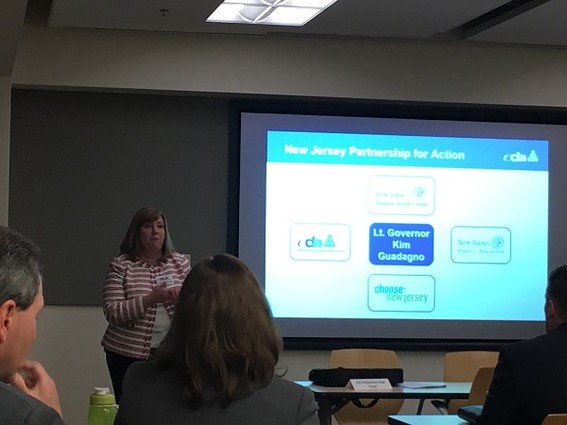
One of the most visible programs for startups offered by the New Jersey Economic Development Authority (EDA) is the Founders & Funders event, where startups are matched with investors and get to sit down with them in ten-minute one-on-one meetings. The EDA holds this event twice yearly.
NJTechWeekly.com went to Founders & Funders on April 27 and interviewed several of the founders who came to find funding partners. This is the second part of a two-part story. The first part can be found here.
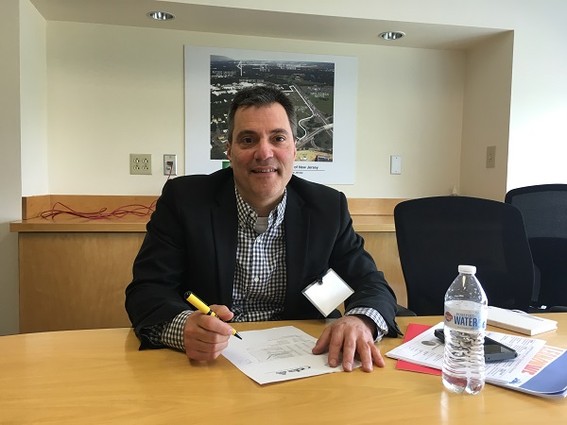
LeanOnWe (Saddle River): LeanOnWe is a managed home caregiver marketplace that is an outgrowth of founder Ron Gold’s personal experience “I was hit by a car while bicycling,” he told us. “A woman fell asleep and went into me head on and I nearly died, but I was left a paraplegic.
“After two months in ICU and three months in rehab, I came home. And amongst everything else that I was dealing with, I was shocked to find out that my good private healthcare policy did not cover homecare for other than a short period of time.” He added that many people experience the same problem. “I saw this with my folks, and now I’m experiencing this myself.”
He said that he and his wife realized that there were only two options. “One is to pay an agency out of pocket. And people will do almost anything to avoid that, primarily because of costs, but there are other reasons. And the other option is to find someone on your own. Most people do, but you really know nothing about that caregiver. It’s the luck of the draw. Your neighbor’s uncle’s cousin might recommend someone or you may find them on Craigslist. I figured this is no way to find a caregiver.”
So Gold created LeanOnWe. “We have almost 700 caregivers on our marketplace whom we’ve met, we’ve vetted, we’ve referenced, we’ve fingerprinted and we’ve videotaped. … We now have all this information about the caregiver.”
He gave the example of someone’s mother falling and breaking a hip: “Now they need help. They tell us what they need. They need help in the shower, in the kitchen, in the bathroom. They really want someone who can speak Italian. They have a couple of pets in the house, so it better be somebody who is good with pets. They need someone who drives.” So, they had some pretty specific filters and, of course, there were geographic limitations.
“The system spits out four or five people and, as a family, they can make a decision. We don’t employ the caregivers. The caregivers and the family agree on a rate.” For Gold, it cost $25 an hour for a caregiver with an agency he had been set up with. The caregiver was only making $10 an hour.” In many cases families can pay around $16. The family is much happier because they are paying less, the caregiver is making more and is much more motivated, and “now they can earn a living,” he said.
The meetings with investors went very well, Gold told us. “Coming into the meetings, you really have to do research on the investors: What stage are these investors? What sectors do they invest in? Would they be appropriate for me? Would they be appropriate now? Would they be appropriate in the future? It’s really a dating process. Someone may be appropriate now. Someone else might be very appropriate down the road a year, and you need to maintain that relationship and develop that relationship because you know they might be perfect for you later. It’s all about following up.” He added that a lot of people gave him good advice about “how to go about developing partnerships, which would be a good way for me to grow my business.”
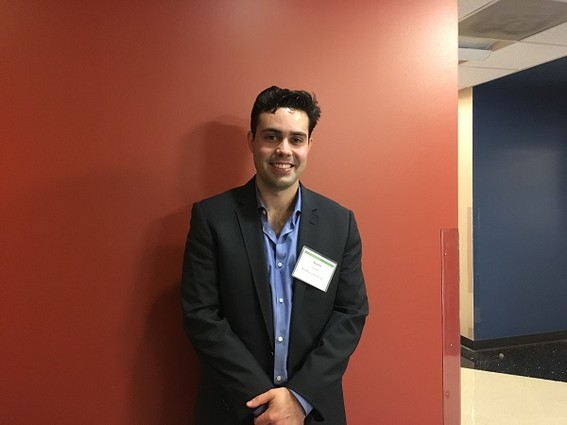
BuildSourced (Edison): BuildSourced is an internet-of-things (IoT) company that tracks capital assets for the oil and gas, construction, and waste-management industries, said Austin Conti, cofounder and CEO. “We utilize QR codes, RFID and eventually other devices, which we put on the assets. This works with our cloud-based software. Our platform is agnostic to what type of tracker you use; they all integrate with our system. We also have a lot of expertise in the construction industry” and, he added, “we designed the platform so that it is very simple for people in the field to use and understand.”
Conti said that, as an inexperienced founder, he thought the event provided him with an education about what it takes to get money from investors. “It’s really good learning here, and we were asked to follow up with some of the investors,” he said.
Asked if he was given any good advice, Conti said he received advice about the timing of funding and the general metrics they would have to achieve to be eligible. “I think this was a great event for founders, especially founders like me. I’m a young founder and I’m glad they put this together.”
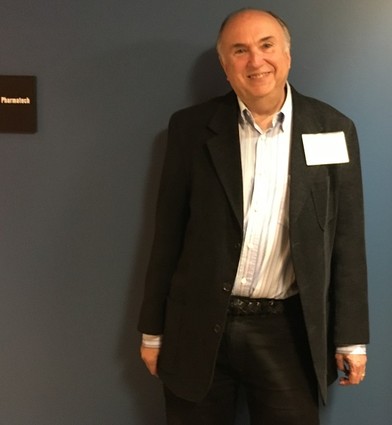
BAMnet (Hamilton): David Sobin, CEO of BAMnet Corporation, spoke to us about ReplayLocker, which provides instant replay on the sidelines at high school football games to coaches and spectators in the stands. “A few seconds after the play is over, everyone with a smartphone gets to see an instant replay of the play that just ended,” he said.
Sobin noted that coaches are the company’s primary target market. “Coaches will do anything to win games; and if they have this, they can show their players what they did wrong on a particular play during the game, and help them correct whatever they are doing,” he said. “Whether it is football, basketball, hockey or baseball, being able to show a player what they did right or wrong within a minute after they did it is the best way to teach anybody.”
He added that some of his matches with investors were better than others, but even if they were not a good match, and he knew they would not be making an investment, “they still have valuable advice and they have other people they know who might be a better match. Any meeting is a good meeting, even if they don’t write a check.”
Investors did give him some advice he may well follow. One person said it might be better for him to “ask for less money now, and look for another round later, rather than trying to ask for a big round that gets us directly to breakeven.” That may make it easier for investors to invest in his company. Someone else suggested that the use of money for sales and marketing makes investors uneasy, so he should perhaps seek a channel partner to help finance that outlay. “Then you can get by without having to ask for so much from an actual investor.”
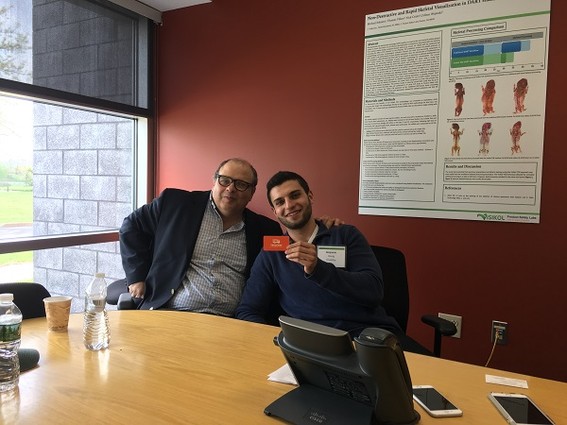
TruckPay (Tenafly): Cofounders Barry S. Honig (CEO) and Benjamin M. Honig (CTO) came to Founders & Funders to find investors for their company, TruckPay, which is “disrupting the $100 million earth-moving-logistics industry,” said Barry. “We have a complete vertically integrated enterprise platform to handle every aspect of earth-moving logistics. We have the ability to handle the logistics of excavators, dump trucks and anything being used, for example, to build new highways, rail systems, malls, big shopping centers, bridges. … That industry is largely run today with paper tickets, and people who call other people to marshal resources,” he continued.
The platform allows government agencies and construction companies to place requests for bids for jobs. “We match people up with the resources they need.” It also facilitates validation, to ensure that all of the work was done the right way, he said. “We also allow for electronic payments to the people who did the work.”
Added Benjamin, “We’ve created an iOS, Android and Web platform to do all of this. Right now, if a construction company needs a dump-truck driver to go from point A to point B, they have three options. First, they can use their own trucks. Second, an independent owner-operator can pull up to a sandpit one day and say they are free to work. Third, and this is what they generally do, is they will go through a broker.” However, brokers mark up the cost by 60 percent, he noted.
When the driver pulls up to the site, they are given a paper ticket, which can be written by hand. Then they drive from point A to point B. But there is some fraud that takes place with these paper records, Benjamin said.
Barry explained that the startup had released the platform in the Houston market several weeks before, and as of the date of Founders & Funders, the company had 80 drivers on the platform. They are looking at some large projects around the U.S., as well as overseas in the future.
“This is a technology that enables small independent operators who participate in large projects to be treated very fairly because we ask for less than half of the traditional broker rates that people pay. Both sides of the transaction get treated with transparency,” he said.
We asked the duo about their meetings with investors. “So far, we’ve had four meetings, and we thought they were productive. In one or two cases, there was interest in following up,” Barry said. He pointed out that the addressable market is very large, amounting to many hundreds of millions of dollars, but not everyone is familiar with earth-moving logistics, so they had to educate the investors, which was difficult to do in 10 minutes.
“Normally, our meetings with investors are 90 minutes long or so. It was really interesting to have to pare this down and spit it out for them,” Benjamin said.

